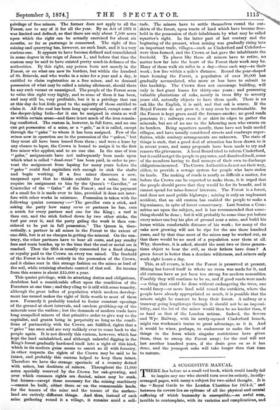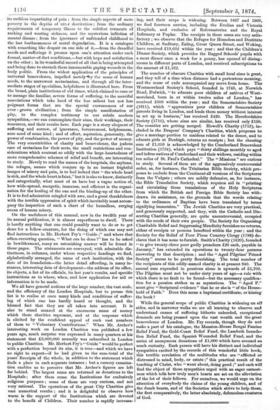A SUGGESTIVE MANUAL.
rillIERE lies before us a small red book, which could hardly fall
to inspire any one who should turn over its orderly, lucidly- arranged pages, with many a subject for two-sided thought. It is the "Royal Guide to the London Charities for 1874-5," and between its covers lies an epitome of all the physical and mental suffering of which humanity is susceptible,—an awful SIMI, terrible to contemplate, with ita varieties and complications, and
its ruthless impartiality of pain ; from the simple aspects of mere poverty to the depths of utttr destitution ; from the ordinary requirements of temporary illness to the subtlest torments of racking and wasting sickness, and the mysterious infliction of mental disease ; from the ignorance of unfriended childhood to the last loathsomeness of moral degradation. It is a catalogue with something like despair on one side of it,—from the dreadful needs and sufferings it presses upon one's attention under such formal, matter-of-fact conditions,—but with hope and satisfaction on the other; in its wonderful record of all that is being attempted and being done to staunch these innumerable gaping wounds in the body politic. From the widest application of the principles of universal benevolence, impelled merely 'by the sense of human needs, to the narrowest sectarianism, and through all the inter- mediate stages of specialism, helpfulness is illustrated here. From the broad, plain institutions of old times, which claimed to cure or to assuage the familiar, severe forms of suffering, to the merciful associations which take heed of the less salient but not leas poignant forms that are the special excrescences of our over - grown civilisation ; from the simple manifestation of pity, to the complex testimony to our subtle modern sympathies,—we can contemplate their aims, their workings, their resources, and their results here. Each page is a story eloquent of suffering and sorrow, of ignorance, bereavement, helplessness, sore need of some kind ; and of effort, aspiration, generosity, the power of combination, the power of pity, and the power of money. The very eccentricities of charity and benevolence, the jealous care of sectarians for their sects, the small restrictions and con- siderations which contrast so oddly with the large-heartedness of more comprehensive schemes of relief and benefit, are interesting to study. Merely to read the names of the hospitals, the asylums, the refuges, names which conjure up in an instant frightful images of misery and pain, is to feel indeed that "the whole head is sick, and the whole heart is faint," but it is also to know, distinctly and categorically, what most of us have but a vague notion of, how wide-spread, energetic, immense, and efficient is the organi-
sation for the healing of the one and the binding-up of the other. It is to feel admiration mingled with awe, and a great thankfulness with the terrible oppression of spirit which inevitably must accom- pany the inspection of such a chart of the boundless, surging ocean of human misery.
On the usefulness of this manual, now in the twelfth year of its annual publication, it is almost superfluous to dwell. There is hardly anything that one could possibly want to do or to get done for a fellow-creature, for the doing of which one may not find instructions in Mr. Herbert Fry's "Guide ;" and where that often-recurring question, "What can be done ?" has to be asked in bewilderment, many an astonishing answer will be found in these pages. The statements are conveyed, with admirable dis- tinctness, in columns, under whose respective headings we find, alphabetically arranged, the name of each institution, with the date of its foundation—the latter detail affording, in many in- stances, interesting data of development---the address of its office, its objects, a list of its officials, its last year's results, and specific instructions as to where, when, and how application for aid or information is to be made.
We all have general notions of the large number, the vast scale, and the efficiency of the London Hospitals, but to peruse this list is to realise at once many kinds and conditions of suffer- ing of which one has hardly heard or thought, and the blessed fact that they are all taken into account. It is also to stand amazed at the enormous sums of money which these charities represent, and at the response which is elicited by the confident appeal of such vast numbers of them to "Voluntary Contributions." When Mr. Archer's interesting work on London Charities was published a few years ago, much surprise was expressed in many quarters at his statement that £3,000,000 annually was subscribed in London to public Charities. Mr. Herbert Fry's " Guide" would be perfect with a perfection beyond its aim, it is true—and which we have no right to expect—if he had given us the sum-total of the years' Receipts of the whole, in addition to the statement which finds a place in each separate instance ; but a cursory examina- tion enables us to perceive that Mr. Archer's figures are left far behind. The largest sums are returned as donations to the Hospitals ; after them come the Institutions for exclusively religious purposes ; some of these are very curious, and not very rational. The operations of the great City Charities give vast numerical results ; and it is delightful to observe how warm is the support of the Institutions which are devoted to the benefit of Children. Their number is rapidly increase- ing, and their scope is widening. Between 1867 and 1869, we find fourteen entries, including the Evelina and Victoria Hospitals, and exclusive of Reformatories and the Royal Infirmary at Poplar. The receipts in these cases are very satis- factory; we observe that the Refuges for Homeless and Destitute Children, at Sudbury, Ealing, Great Queen Street, and Woking, have received £19,602 within the year ; and that the Children's Dinner Society, which provides the Ragged Schools' pupils with a meat dinner once a week for a penny, has opened 43 dining- rooms in different parts of London, and received subscriptions to the amount of £1,162.
The number of obscure Charities with small local aims is great, and they tell of a time when distance had a portentous meaning, and the sense of exile accompanied any move from home. The Westmoreland Society's School, founded in 1746, at Norwich Road, Dulwich, "to educate poor children of natives of West- moreland, born in or within twelve miles of London," has received £600 within the year ; and the Somersetshire Society (1811), which "apprentices poor children of Somersetshire parents living in London, and lends them money without interest to set up in business," has received £420. The Herefordshire Society (1710), whose aims are similar, has received only £150. The counties are getting merged. Howell's Charity (1713), in- cluded in the Drapers' Company's Charities, which proposes to give a marriage portion to maidens related to the donor, and to educate girls at Denbigh, returns no receipts ; but the cheering. sum of £1,059 is acknowledged by the Cumberland Benevolent Institution (1734), which pays "thirty shillings monthly to aged and infirm natives of Cumberland and their widows, residing within ten miles of St. Paul's Cathedral." The " Missions " are curious to study. Several of them are of the aggressively controversial order, as, for instance, the Trinitarian Bible Society, which pro- poses to exclude from the Continent all versions of the Scriptures from the Vulgate ; others are mildly defensive, as, for instance, the Bible Translation Society, which requires aid in "printing- and circulating those translations of the Holy Scriptures from which the British and Foreign Bible Society has with- drawn its assistance, on the grounds that the words relating- to the ordinance of Baptism have been translated by terms signifying immersion." The Jewish Charities are very practical, and generously supported, and they, with the Catholic and Dis- senting Charities generally, are quite uncontroversial, occupied with the needs of their own people. The Society for Organising- Charitable Relief and Suppressing Mendicity furnishes no returns, either of receipts or persons benefited within the year ; and the' Society for the Relief of Poor Pious Country Clergy (1788) de- clares that it has none to furnish. Smith's Charity (1620), founded "to give twenty-three poor godly preachers £20 each, payable in January," has extended its operations to twenty-four persons answering to that description ; and the "Aged Pilgrims' Friend Society" seems to be pretty flourishing. The total number of the recipients of this oddly-named charity is at present 940. The annual sum expended in pensions alone is upwards of /5,700. The Pilgrims must not be under sixty years of age—a rule with which there is no fault to be found—but the necessary qualifica- tion for a pension strikes us as mysterious. The "Aged P." must give "Scriptural evidence" that he or she is "of the House- hold of Faith." Does this mean a baptismal certificate, or kissing- the book?
While the general scope of public Charities is widening on all sides, and in narrower walks we are all learning to observe and understand causes of suffering hitherto unheeded, exceptional demands are being pressed upon the vast wealth and the great benevolence of London. Mr. Fry records, though they do not make a part of his catalogue, the Mansion-House Bengal Famine Relief Fund, the Gold-Coast Relief Fund, the Lambeth Inunda- tion Relief Fund, the Spanish Wounded Relief Fund, and the series of anonymous donations of 11,000 which have aroused so much curiosity. Each person will have his distinct and individual sympathies excited by the records of this wonderful little book, this terrible revelation of the multitudes who are "afflicted or distressed in mind, body, or estate ;" this practical result of the teaching of Christ, who "went about, doing good ;" and each will find the object of those sympathies urged with an eager earnest- ness which tells how truly men's hearts are set on the alleviation of the lot of their fellows. For ourselves, we would urge on the attention of everybody the claims of the young children, and of the dumb beasts, and of the Societies which strive to help these, the first comparatively, the latter absolutely, defenceless creatures of God.































 Previous page
Previous page